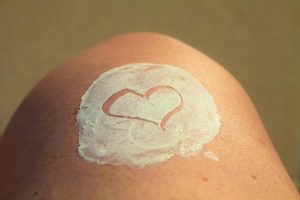As the sun positions itself at a higher angle, and the increasing daylight allows the weather to reach nearly 110°F in the state of Arizona, we are becoming exceedingly prone to ultraviolet exposure and skin cancer.
Cancers of the skin are the most common types of autoimmune diseases. The American Cancer Society reports that “About 5.4 million basal and squamous cell skin cancers are diagnosed each year and occurs in about 3.3 million Americans, as some people have more than one.”
How do you protect yourself from skin cancer?
The majority of damage to skin DNA results from ultraviolet (UV) radiation found in sunlight. To protect your body (especially your skin cells), it is crucial to wear sunscreen before basking in direct sunlight. Keep in mind that sunburn can occur in less than 15 minutes, and even in seconds when exposed to intense ultraviolet light.
What is sunscreen? 
Sunscreen is a combination of several ingredients that help prevent the sun’s UV radiation from reaching the skin. There are two types of UV radiation, UVA and UVB, both of which can damage the skin DNA and increase your risk of cancer.
How do you make sure that your sunscreen blocks UVA and UVB?
Sunscreens have varying abilities to fight UVA and UVB. According to the American Academy of Dermatology (AAD), for a sunscreen to be effective, you must look for these key characteristics:
1. SPF of 30 at minimum
SPF or Sun Protection Factor is a relative measure of how long a sunscreen will protect you against ultraviolet rays. The American Cancer Society (ACS) suggests sunscreen of at least 30 SPF, while the Environmental Working Group (EWG) recommends avoiding sunscreens with an SPF level of over 50. This recommendation serves as a warning to prevent consumers from forming a false sense of security against burns and skin cancer.
2. Broad spectrum
The best sunscreen offers protection from both types of UV light. A broad-spectrum or full-spectrum sunscreen does just that and shields your skin from the following:
- Wrinkles, age spots, and premature aging of the skin brought upon by UVA rays.
- Red, painful, itchy skin that is hot to the touch caused by UVB rays.
3. Water-resistant properties
Sunscreens that are resistant to water must pass independent tests to prove that they can retain their stated SPF during physical activities like swimming, or when you are sweating. Specifically, the Food and Drug Administration (FDA) only allows the claims “Water Resistant (40 min)” or “Water Resistant (80 min)” to be sold in the United States.
Sunscreen applications tips
It is advised to apply a generous amount of sunscreen to all areas of your body. For adults, the AAD suggests using an ounce every two hours, or more frequently if you are always wiping the sweat off of your body. It is also recommended to apply the product at least 20 to 30 minutes before going outdoors. It takes sunscreen a significant amount of time to bind to your skin and provide the protection you need.
The verdict
Sunscreen is not limited to summer and is a daily necessity for people in Arizona and tropical locations. Not only does it block harmful UV rays, but it also facilitates the production of vitamin D in the skin, which helps prevent skin cancer. So, make sure to apply sunscreen whenever you are out and about in daylight!
Learn more about skin cancer
Skin cancer is a vicious disease that affects the lives of millions of people around the world. Now that you know about the role of sunscreen in skin cancer prevention, lower your cancer risk even further by learning about the 10 Superfoods that Combat Skin Cancer.
If you are on the lookout for alternative cancer treatments, do not hesitate to contact New Hope Medical Center at 480-757-6573, or email us at [email protected].


